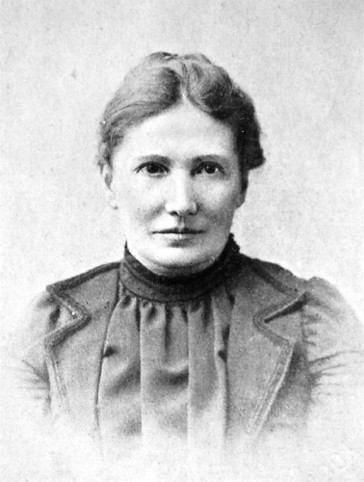Yefymenko, Aleksandra
Yefymenko, Aleksandra [Єфименко, Александра; Jefymenko] (Russian: Efimenko; née Stavrovskaia), b 30 May 1848 in Varzuga, Kola county, Arkhangelsk gubernia, Russia, d 18 December 1918 on Lubochka khutir, near Pysarivka, Vovchansk county, Kharkiv gubernia. (Photo: Aleksandra Yefymenko.) Russian historian and ethnographer; full member of the Imperial Russian Geographic Society, the Moscow Psychological Society, the Kharkiv Historical-Philological Society, and the Kyiv Juridical Society and honorary member of the Poltava Learned Archival Commission. She worked as a teacher in Kholmogory. There she married the exiled Petro S. Yefymenko in 1870 and was consequently forbidden to teach. Instead she researched and published studies on the dialect, socioeconomic history, and folkways of Arkhangelsk gubernia and on Russian customary law. In the 1880s and 1890s Yefymenko was an active member of the Kharkiv Historical-Philological Society. She published book-length articles on the history of Ukrainian-Polish conflicts, the history of Right-Bank Ukraine, and Ukrainian church brotherhoods and guilds, and shorter ones in defense of the Ukrainophiles and on customary law (including the role of women in peasant families), community courts, and peasant relations in Ukraine, the haidamakas, the Little Russian Collegium, the Turbai uprising, the nobility in the Hetman state, dress and household items in Slobidska Ukraine, the Ukrainian language in elementary schools, and Ukrainian writers, such as Hryhorii Skovoroda, Ivan Kotliarevsky, Nikolai Gogol, Taras Shevchenko, and Volodymyr Antonovych. Twenty-four of her articles were reprinted as the collection Iuzhnaia Rus’ (Southern Rus’, 2 vols, 1905) by the Saint Petersburg Shevchenko Society. Her monographs in Russian on the history of the Ukrainian people (2 pts, 1906; 2nd edn 1990; Ukrainian trans 1922, ed Dmytro Bahalii) and the history of Ukraine and its people (1907) were widely read. In 1903 she delivered the first speech at the unveiling of Kotliarevsky's monument in Poltava. From 1907 to 1917 she taught Russian and Ukrainian history at the Bestuzhev Higher Courses for Women in Saint Petersburg. She was the first woman in the Russian Empire to be awarded an honorary PH D (in Russian history, by Kharkiv University, 1910). Yefymenko was murdered by bandits, together with her daughter, Tatiana, at their homestead. In 1919 Bahalii's annotated bibliography of her works was published by the Academy of Sciences of the Ukrainian SSR in the Zapysky of its historical-philological section (see Zapysky Istorychnoho-filolohichnoho viddilu VUAN), and her elementary-school textbook on Ukrainian and Russian history was published in Russian and Ukrainian in Kharkiv. P. Markov's book about her appeared in Kyiv in 1966.
Roman Senkus
[This article originally appeared in the Encyclopedia of Ukraine, vol. 5 (1993).]
